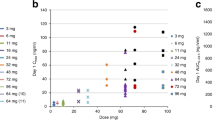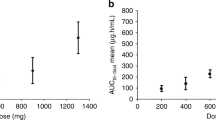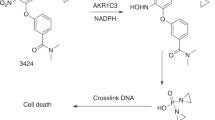Abstract
GI147211 is a novel, totally synthetic camptothecin with promising preclinical and early clinical activity. This study was designed to determine the maximum tolerated dose of Gl147211 as a 72-h infusion and to describe its pharmacokinetics and pharmacodynamics on this schedule. In a single-arm, rising-dose study in patients with advanced cancer, eight cohorts of three or more patients received 72-h infusions of Gl147211 at doses ranging from 0.25 to 2.5 mg m(-2) day(-1). Forty-four patients received a total of 124 cycles. All patients had refractory tumours and 40 had received prior chemotherapy and/or radiotherapy. Whole-blood Gl147211 lactone, total blood and total concentrations were measured during and over the 12 h following the infusion. Myelosuppression was observed at all dose levels. Neutropenia was dose limiting at 2.0 mg m(-2) day(-1) in minimally pretreated patients, while both neutropenia and thrombocytopenia were limiting at 1.5 mg m(-2) day(-1) in those more heavily pretreated. Phlebitis occurred with infusions through peripheral veins early in this study, necessitating the use of central venous access. Other toxicities included mild nausea and vomiting, fatigue, headache, central venous catheter infections and alopecia. Three partial and two minor responses lasting 8-34+ weeks were noted in patients with ovarian, colon and breast carcinomas and hepatoma. Mean steady-state concentrations of Gl147211 increased with dose over a range of 0.25-1.24 ng ml(-1). The mean terminal elimination half-life was 7.5 h, and the clearance averaged 1074 ml min(-1) m(-2) over the doses studied. The mean fractional excretion of unchanged drug in urine was 0.114. Gl147211 lactone exposure correlated with haematological toxicity. The recommended phase II doses for this regimen are 1.75 mg m(-2) day(-1) and 1.2 mg m(-2) day(-1) for minimally pretreated and heavily pretreated patients respectively. At these doses, steady-state Gl147211 concentrations within the range of those effective in vitro were achieved. Extensive phase II evaluation of this compound and further phase I trials evaluating more prolonged infusions are ongoing.
This is a preview of subscription content, access via your institution
Access options
Subscribe to this journal
Receive 24 print issues and online access
$259.00 per year
only $10.79 per issue
Buy this article
- Purchase on Springer Link
- Instant access to full article PDF
Prices may be subject to local taxes which are calculated during checkout
Similar content being viewed by others
Author information
Authors and Affiliations
Rights and permissions
About this article
Cite this article
Paz-Ares, L., Kunka, R., DeMaria, D. et al. A phase I clinical and pharmacokinetic study of the new topoisomerase inhibitor GI147211 given as a 72-h continuous infusion. Br J Cancer 78, 1329–1336 (1998). https://doi.org/10.1038/bjc.1998.679
Issue Date:
DOI: https://doi.org/10.1038/bjc.1998.679



